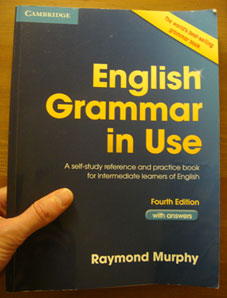The Truth: Grammar issues will inevitably arise in English conversation class.
And if the teacher cares about the student, then these grammar issues should be addressed. For a purely conversational class, some students might let the teacher get away with saying "Sorry, I'm not a grammar expert." But the bottom line is that communication problems are often rooted in grammar. These problems need to be fixed so the student can progress.
Grammar questions can be a source of anxiety for teachers, however, regardless of whether you're TESOL certified or just someone with a good command of the language.
This is how I deal with grammar questions in English class:
1) By Having Adequate Knowledge
- nouns
- adjectives
- adverbs
- verb tenses
- prepositions
- articles
- 1st, 2nd & 3rd conditionals
These items may have been covered (to an extent) in your teacher training. If you are a self-taught teacher, then familiarize yourself with these terms by taking a look at this English grammar reference sheet I created. Identification of the basic elements of the English language is the first step; the second is explanation. A teacher is expected to know the difference between a comparative and a superlative. However, it takes experience (and study) to be able to confidently explain the usage of more complicated structures such as the 3rd conditional. If you don't have this knowledge, then proceed to the next step.
2) By Letting the Experts Teach It
It contains 145 units on verb tenses, conditionals, reported speech, auxiliary verbs, articles, relative clauses, prepositions, phrasal verbs, et cetera. Grammar-wise, the book has basically everything a student needs to master for B1, B2 and even C1 CEFR levels.
A good grammar book such as this can explain English grammar rules better than I can because it was written by experts. When I recognize a student of mine has a problem with a particular grammar area (e.g. even/even though), I copy that particular unit for him. He goes home, reads the explanations, and completes the accompanying exercises as homework. The next time I see him, generally the problem is solved. This approach saves me a lot of energy and my students a lot of class time.
(The 4th Edition (2012) of English Grammar in Use is available on Amazon US, UK, Canada.)
3) By Doing Research
If my student has an English usage question about something like the difference between according to and in accordance with (and I can't explain it confidently), then I tell him I'll look into it and get back to him. A Google Search usually leads me to the answer (I often find the answers on forums such as Englishforums.com). By doing research this way, I learn what I was not previously able to explain and thereby become a better teacher.
And that is how I handle grammar-related issues in English conversation class. I hope you found this useful.
Best of luck in your classes!
- Matthew Barton / Englishcurrent.com
Related: How to Teach Conversational English Class


One English teacher says that the sentence “Joan cant speak English.”Harry too can’t speak English” instead he says the correct form is “Harry can’t speak English either.
Please explain this usage.
The teacher is right. You don’t use ‘too’ in negative sentences. Instead, use either.
A: I love pizza
B: I love pizza too! <-- the verb is not negative (love) A: I don't have a brother. B: I don't have a brother either. <-- the verb is negative (don't)
would you mind telling me the difference between intelligent and intellectual?
intelligent means clever or smart. This adjective describes people.
intellectual means ‘relating to the intellect.’ The intellect is a person’s reasoning ability, or brainpower.
So, intellectual development means developing someone’s brain so he/she can reason and think better.
That’s typically the difference.
Brilliant advice! I'm a newly qualified CELTA teacher with not much teaching experience and I'm still teaching myself grammar. I'm a native speaker with a great command of the English language, but it's the explaning and defining part that stumps me! As previously mentioned, I'm teaching myself grammar so that I can be a better teacher for my students and your article has helped ease my mind about a few things. So thank you!
-Shelly
nice but can you more explan for me
Supercalafragelisticexpialadoscious!
What about tongue twisters for practicing linguistics ? Such as “rubber baby buggy bumpers ” five times fast it is almost guaranteed to get you a good laugh and is good way to break the ice in an awkward situation .
“If Peyer Piper picked a peck of pickle peppers. How many pickled peppers did Peter Piper pick?” Limericks can also be fun to work with does anyone have any favorite limericks to share?
Hello. I have posted some beginner ones here: https://www.englishcurrent.com/pronunciation/english-tongue-twisters-beginners-esl/
Here are a few other ideas that may inspire conversation . Have your students compose a poem or short story about a favorite childhood experience and have them recite it to fellow class mates and get them to respond by sharing their feeling or some of their own personal experiences. Also you can have students create a hyperthetical real life situation and make a play or skit out of it and see where things go from there! Each student takes on the persona of all the players in the scit and let the students improvise and make up their own dialog. Teachers can also participate if things are not moving and Get some sparks flying
There is nothing like a good controversial statement to inspire a good argument or debate about a current event I’ve life occurrence everyone has an opinion and will lukely express it if stirred to . The teacher can be the moderator and peacemaker if need be.
Please share some other fun and creative methods of inspiring students to converse .